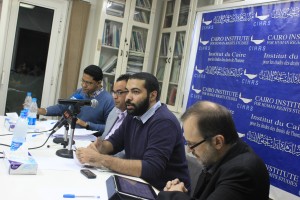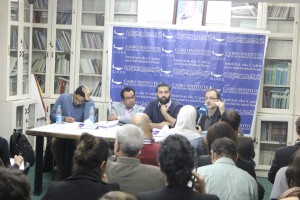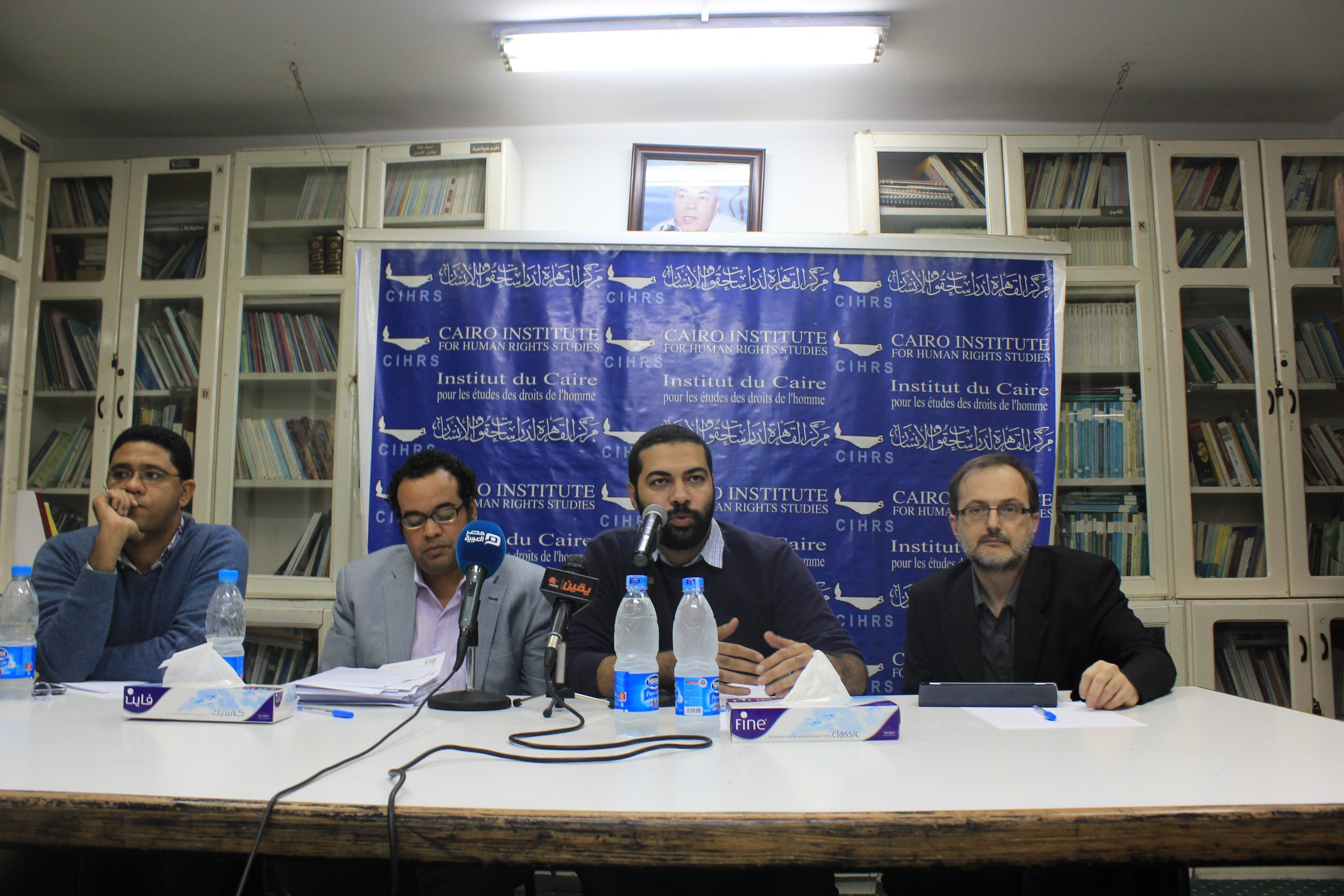On Sunday evening, December 7, the Cairo Institute for Human Rights Studies organized a panel discussion, as part of the Ibn Rushd Salon program, titled “Law and Justice: a Reading of Mubarak Verdict.” The panel discussion featured Ahmed Ragheb, Lawyer and director of the National Group for Human Rights and Law; Associate Professor Hani Sayed, the head of the law department at AUC, and a lecturer at Harvard University; and Dr. Amr Abd al-Rahman, the director of the civil liberties unit at the Egyptian Initiative for Personal Rights. The evening was moderated by Bassem Zakaria Al-Samragy, a researcher at the CIHRS.
Al-Samragy opened the panel discussion by noting that the Mubarak case is just one of several involving the killing of demonstrators since January 25, 2011, most of which ended in acquittals. These acquittals were the prelude to clearing the Mubarak regime of the deaths of hundreds of demonstrators in Egyptian squares, which raised the pivotal question of the evening about the relationship between law, justice, and revolution.
Before turning to the Mubarak case, Ahmed Ragheb made three critical observations that he described as minefields. First, there is no provision in the law criminalizing commentary on judicial rulings, meaning that any person has the right to discuss and comment on such rulings. Second, Ragheb rejected as absolute the rule that the verdict is tantamount to the truth, arguing that it is the truth until proven otherwise. If not, there would be no such thing as appeals of court judgments, retrials, and the reversal of judgments. Third, Ragheb cited the rule that the judge only rules based on the documents and evidence before him, but he added, “The criminal judge has broader prerogatives if he feels that the case documents before him are incomplete. The law gives him the power to order a new investigation if he is not satisfied with the evidence put before him.” Ragheb continued, “This did not happen in the Mubarak case due to the lack of a political will to convict him.” Ragheb cited several pieces of evidence in support of this statement. He noted that the Mubarak trial was not a demonstration of the political will of a regime that decided to stand with the revolution and its goals, but was the result of popular pressure and mass protests demanding accountability for Mubarak. These demonstrators did not only seek accountability for Mubarak for the events of January 25, but for the corruption of his years in power. The process of accountability, however, was limited to the January crimes.
Ragheb added that the lack of political will was demonstrated also in the failure of the police to bring incriminating evidence of Mubarak’s involvement in the killing of demonstrators. Although some prosecutors sought out such evidence, overall the Public Prosecution did not seek to convict Mubarak. Even the fact-finding commissions that attempted to aid the prosecution in evidence gathered were subject to various pressures: in one case, their report was disregarded and not included in the case files and in another the commission was dissolved after July 3 following the release of its report and the prosecution took no action to investigate the report’s contents. Hani al-Sayyed offered a theoretical reading of the relationship between the law and the revolution, noting that the law that protected decades of tyranny is the same law which the revolution turned to prosecute the tyranny of its framers. “The tyrant should not be prosecuted by the laws he drafted to protect himself,” al-Sayyed said.
Sayed noted that the relationship between revolution and law is a contentious one, at times becoming one of outright contradiction. The law is ultimately the product of a revolution, and the modern concept of rule of law emerged from the French revolution, at the heart of which were the slogans of justice, equality, and freedom. At the same time, however, revolution remains an unlawful act because it carries an objection to existing law and to its framers (the ruling authority). Sayed thus declared the greatest setback and trick against the Egyptian revolution to be the discourse that the revolution began, triumphed, and ended in 2011. This discourse was an attempt to kill the revolution, Sayed said, adding that the revolution began but has not ended as long as its goals and aspirations for a new state have not been realized.
Sayed rejected claims that the law is the antithesis of tyranny, stating that in many countries the law can be a tool of tyranny and a means of protecting it, although it can also provide protection from it. In the Mubarak era, the law was a tool to secure autocracy, being a part of a holistic autocratic political system. He added that Mubarak and the ruling elite should have been politically prosecuted for all the corruption that occurred during their rule with regard to health, education, liberties, work, and housing; yet, how can all these issues be reduced to a single criminal charge?
Amr Abd al-Rahman agreed with Sayed that for more than three decades Mubarak amassed a legal arsenal that rendered the constitution meaningless, confiscated freedoms it claimed to grant, and protected a despotic regime. Mubarak’s law was therefore not a guarantor of revolutionary justice. Abd al-Rahman also discounted the idea of revolutionary courts, proposing instead transitional justice as a solution. “The choice of having revolutionary courts should not be a topic of discussion because had the Egyptian revolution been strong enough to have revolutionary trials, it would have happened,” he said. “If the current regime is truly harmed by Mubarak’s acquittal, then why the unjustified failure to issue a transitional justice law?”
Abd al-Rahman also focused on judges as principal actors in the application of the law and the achievement of justice. He stressed the importance of treating judges as a social group that is not separate from the wider community. Over Mubarak’s tenure, he said, democratic forces hoped to counter the regime through the empowerment of judges and their independence, adding that those who defended judicial autonomy in 2006 could not imagine where the judiciary would be in less than ten years.
Abd al-Rahman noted that while we realized that the judiciary needed its independence, it also needed genuine democratization and a real awareness of rights and the provisions of international conventions. He believed rights advocates attempted to do this by bringing new types of cases before the Egyptian judicial system that required judges to engage in research and reconsiderations and leave behind impractical legal residues. These were tantamount to a challenge to the epistemic authority of judges, forcing them to open up to reality.
Abd al-Rahman said that the constitutional declaration issued by former president Mohammed Morsi was the judiciary’s worst nightmare and radically changed its stance on the idea of revolution, which had come to threaten its independence and dignity. One of the consequences is that the chief justice of the Supreme Constitutional Court, Adli Mansour, while serving as the interim president, disregarded constitutional provisions, made way for exceptional measures, and at times refrained from upholding the principles of equality and justice.
Abd al-Rahman concluded his talk by noting that enforcing the law is meaningless prior to democratizing the institution of the judiciary; there can no rule of law without participatory democracy that enshrines the right of the public to legal recourse.


Share this Post

